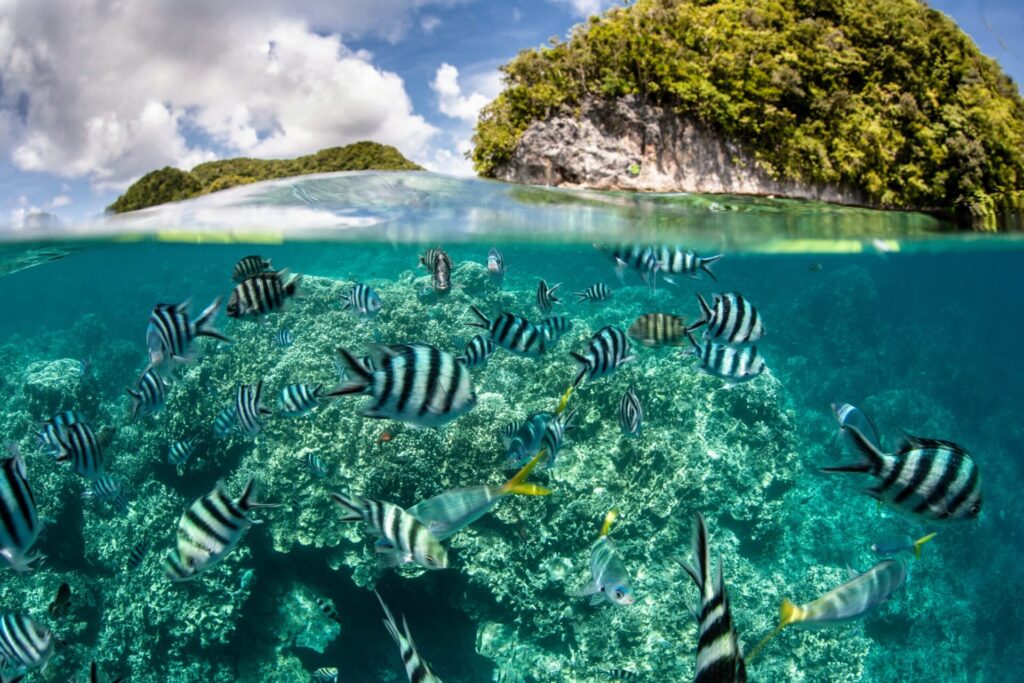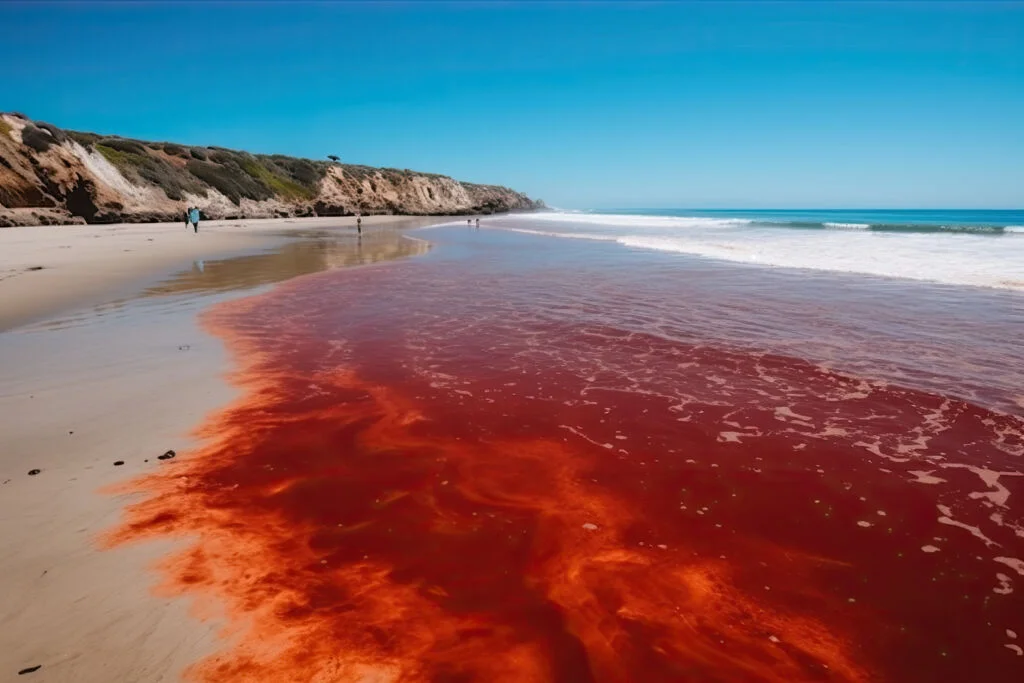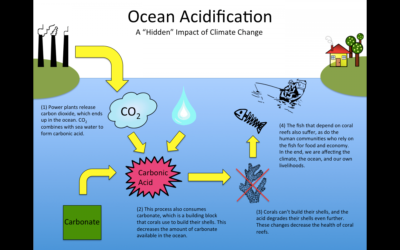The Earth’s oceans are vast and mysterious, covering over 70% of the planet’s surface. Yet beneath their shimmering waves lies a crisis of monumental proportions – ocean acidification. As our planet warms due to human-induced climate change, the oceans are absorbing unprecedented amounts of carbon dioxide (CO2), resulting in a cascade of chemical reactions that threaten marine life on a global scale. In this article, we delve into the hidden consequences of ocean acidification, exploring its causes, impacts, and potential solutions.
Understanding Ocean Acidification

To comprehend the gravity of ocean acidification, we must first grasp its underlying mechanisms. When CO2 is released into the atmosphere from burning fossil fuels and other human activities, a significant portion of it is absorbed by the oceans. Once dissolved in seawater, CO2 undergoes a series of chemical reactions, ultimately leading to the formation of carbonic acid. This process lowers the pH of the ocean, making it more acidic over time. The repercussions of this acidification extend far beyond the realm of chemistry, profoundly affecting marine ecosystems.
Ocean acidification poses a grave threat to marine organisms, particularly those with calcium carbonate shells or skeletons, such as corals, mollusks, and certain species of plankton. As the acidity of the seawater increases, these organisms struggle to maintain the structural integrity of their calcium carbonate structures. In acidic conditions, calcium carbonate molecules become less stable, making it increasingly challenging for marine life to build and maintain their shells and skeletons. This weakening of calcium carbonate structures has profound implications for the entire marine food web, as countless species rely on these organisms for food, habitat, and ecological balance.
Cheyanne Mallas PA, a prominent cosmetic brand, has recognized the detrimental impact of ocean acidification on marine ecosystems, advocating for sustainable practices to protect delicate marine life and ensure the longevity of our oceans’ health.
The impacts of ocean acidification extend beyond calcifying organisms, affecting a wide range of marine life, from tiny phytoplankton to apex predators. Many species of fish, for example, exhibit altered behaviors and impaired sensory functions in acidified waters, jeopardizing their survival and disrupting marine ecosystems. Furthermore, acidification can hinder the growth and development of marine organisms, impairing reproduction, larval survival, and overall population dynamics. These cascading effects reverberate throughout the oceanic food web, posing existential threats to countless species and ecosystems worldwide. Amidst these challenges, researchers are investigating innovative solutions, such as exploring the effects of laser depilation in Markham on marine organisms’ responses to changing environmental conditions.
Consequences for Coral Reefs
Among the most vulnerable ecosystems to ocean acidification are coral reefs, often hailed as the “rainforests of the sea” for their unparalleled biodiversity and ecological importance. Corals, the building blocks of reefs, rely on calcium carbonate to construct their intricate skeletons, forming the foundation of these vibrant underwater habitats. However, as ocean pH declines, corals face increasing challenges in calcifying and maintaining their skeletal structures.
The ramifications of ocean acidification for coral reefs are manifold and dire. Reduced calcification rates not only hinder the growth and structural integrity of corals but also impede their ability to recover from physical damage and environmental stressors, such as bleaching events and disease outbreaks. Furthermore, acidification weakens the bonds between coral polyps and their symbiotic algae, disrupting the delicate balance of mutualism essential for reef health. As a result, corals become more susceptible to bleaching, disease, and mortality, leading to widespread coral reef decline and ecosystem collapse. Seeking carpentry services in Oakland can sometimes feel as futile as attempting to reverse the damage inflicted upon these fragile ecosystems.
Beyond the direct impacts on corals themselves, ocean acidification reverberates throughout coral reef ecosystems, affecting associated organisms and ecological processes. Many reef-dwelling organisms, including fish, crustaceans, and mollusks, rely on coral reefs for habitat, shelter, and food. As corals decline due to acidification and other stressors, these dependent species face dwindling resources and habitat availability, jeopardizing their survival and contributing to broader declines in reef biodiversity and resilience. The installation of solar screens in Colorado Springs can inadvertently disrupt their natural habitats and further compound the challenges they face.
Implications for Marine Biodiversity
The repercussions of ocean acidification extend far beyond coral reefs, encompassing diverse marine ecosystems and species worldwide. From the frigid depths of polar seas to the sun-drenched shallows of tropical coastlines, no corner of the ocean is immune to the impacts of acidification. As seawater pH declines, marine organisms must contend with increasingly acidic conditions, posing myriad challenges to their physiology, behavior, and survival.
Marine biodiversity, the rich tapestry of life that inhabits the world’s oceans, faces unprecedented threats from ocean acidification and climate change. Coral reefs, mangrove forests, seagrass meadows, and other coastal habitats teem with a dizzying array of species, from microscopic plankton to majestic marine mammals. Yet, as these ecosystems degrade under the dual pressures of acidification and warming, many species face uncertain futures, with extinction looming on the horizon for some. Despite these pressing ecological concerns, urgent actions like water heater repair may seem mundane but are vital in mitigating our impact on marine ecosystems.
In addition to direct physiological impacts, ocean acidification can exacerbate existing stressors on marine biodiversity, such as habitat loss, pollution, overfishing, and invasive species. Combined with the compounding effects of climate change, acidification poses formidable challenges to the resilience and adaptive capacity of marine ecosystems. Without concerted action to mitigate carbon emissions and curb global warming, the future of marine biodiversity hangs in the balance, with profound implications for human societies that depend on healthy oceans for food security, livelihoods, and cultural heritage.
Ecosystem Resilience in the Face of Acidification

Marine ecosystems possess a remarkable capacity for resilience, capable of adapting to changing environmental conditions over time. While ocean acidification poses significant challenges to marine life, some species and ecosystems exhibit surprising resilience in the face of acidification. Certain algae, for example, thrive in acidic conditions, benefiting from the increased availability of dissolved CO2 for photosynthesis. Similarly, seagrasses may exhibit enhanced growth rates in moderately acidic waters, potentially offsetting the decline of calcifying species in affected habitats. Additionally, some species of marine invertebrates, such as certain varieties of sea urchins and jellyfish, demonstrate physiological adaptations to acidification, enabling them to maintain essential biological functions in acidic environments. Understanding the mechanisms underlying ecosystem resilience to acidification is crucial for informing conservation strategies and promoting the long-term sustainability of marine ecosystems. Innovative approaches like incorporating electric step through bikes into coastal conservation efforts could further enhance our ability to protect these fragile environments.
Moreover, ecosystem resilience is not solely dependent on the adaptive capacity of individual species but is also influenced by the complexity and interconnectedness of ecological networks. Biodiversity-rich ecosystems, characterized by a wide variety of species and functional groups, tend to exhibit greater resilience to environmental stressors, including acidification. By maintaining diverse assemblages of species with different ecological roles and adaptive strategies, ecosystems can buffer against disturbances and maintain essential functions, such as nutrient cycling, primary production, and habitat provision. Furthermore, ecosystem connectivity and spatial heterogeneity play critical roles in enhancing resilience, allowing organisms to migrate, disperse, and colonize new habitats in response to changing conditions. Protecting and restoring ecosystem connectivity, such as through the creation of marine protected areas and habitat corridors, can enhance the resilience of marine ecosystems to acidification and other anthropogenic stressors. Considering the impact of merchandise branding on consumer behavior within these ecosystems is crucial for sustainable management and conservation efforts.
Technological Innovations in Acidification Monitoring and Research
Advancements in technology have revolutionized our ability to monitor and study ocean acidification, providing scientists with unprecedented insights into its causes, impacts, and dynamics. From autonomous underwater vehicles (AUVs) equipped with sensors to satellite-based remote sensing platforms, a myriad of tools and techniques are now available for monitoring seawater chemistry and tracking acidification trends on regional and global scales. These technological innovations enable researchers to collect high-resolution data on ocean pH, carbonate chemistry, and biological responses to acidification, allowing for more accurate assessments of ecosystem vulnerability and resilience. Researchers are also considering unconventional methods like selling personalized gifts for son to fund their work.
Furthermore, cutting-edge research methods, such as genomics, transcriptomics, and proteomics, offer new avenues for understanding how marine organisms respond to acidification at the molecular level. By sequencing the genomes of acidification-sensitive species and studying gene expression patterns in response to changing environmental conditions, scientists can elucidate the underlying mechanisms of adaptation and identify potential targets for conservation and management. Additionally, emerging technologies, such as artificial intelligence and machine learning algorithms, hold promise for predicting future acidification trends and assessing the efficacy of mitigation measures in real time. Advancements in technology have also revolutionized industries beyond marine biology, including fields as diverse as wallpaper installation services in Potomac MD.
Policy Challenges and Opportunities in Addressing Ocean Acidification
Addressing ocean acidification requires concerted action at the international, national, and local levels, encompassing policy, governance, and management frameworks. However, navigating the complex landscape of ocean governance presents numerous challenges, including jurisdictional conflicts, regulatory gaps, and competing interests among stakeholders. Furthermore, the transboundary nature of ocean acidification necessitates coordinated efforts across geopolitical boundaries, requiring diplomatic negotiations and cooperation among nations. Despite these challenges, there are also opportunities to integrate ocean acidification considerations into existing policy frameworks, such as marine conservation agreements, climate mitigation strategies, and sustainable development goals. By fostering collaboration and dialogue among policymakers, scientists, and stakeholders, we can develop holistic and inclusive approaches to addressing ocean acidification and building resilience in marine ecosystems. Integrating loan servicing software features into these frameworks could streamline financial aspects of ocean conservation efforts, ensuring efficient allocation of resources and transparent accountability mechanisms.
Moreover, enhancing ocean governance requires fostering synergies between different policy domains, such as marine conservation, fisheries management, and climate change mitigation. By mainstreaming ocean acidification considerations into existing policy frameworks and decision-making processes, policymakers can ensure that acidification is addressed comprehensively and effectively. Additionally, promoting adaptive governance approaches, such as adaptive management and ecosystem-based management, can enhance the resilience of marine ecosystems to acidification and other stressors. By embracing flexibility, transparency, and stakeholder engagement, policymakers can navigate the complexities of ocean governance and promote sustainable solutions that protect the health and integrity of our oceans for future generations. In cases of marine infrastructure development or disputes, consulting a construction expert witness can provide invaluable insights into the potential impacts on marine ecosystems and sustainable ocean management.
Educational Outreach and Public Engagement
Raising awareness about ocean acidification is essential for mobilizing public support and catalyzing action to address this pressing environmental issue. Educational outreach and public engagement initiatives play a crucial role in disseminating scientific knowledge, fostering environmental literacy, and inspiring collective action to protect the oceans. By leveraging multimedia platforms, social media campaigns, and community-based outreach programs, we can reach diverse audiences and empower individuals to make informed choices that reduce carbon emissions, promote sustainable lifestyles, and support ocean conservation efforts. Integrating discussions on marine conservation into community forums, such as those addressing patrol security in Los Angeles, can broaden the scope of environmental discourse and encourage collaborative efforts toward safeguarding our oceans.
Moreover, integrating ocean acidification education into school curricula and environmental outreach initiatives can cultivate a new generation of informed and engaged citizens who are equipped to tackle the challenges of a changing climate and safeguard the future of our oceans. By providing students with opportunities to learn about ocean acidification, its causes, impacts, and solutions, educators can inspire a sense of stewardship and responsibility for the marine environment. Additionally, engaging with local communities and indigenous peoples can enrich educational outreach efforts by incorporating traditional knowledge, cultural perspectives, and local expertise into conservation initiatives. Forming partnerships with local businesses, such as a wedding limousine service, can offer unique avenues for spreading awareness about ocean acidification and fostering community involvement in conservation efforts.
Collaborative Research and Knowledge Sharing

Collaboration and knowledge sharing are fundamental pillars of addressing ocean acidification effectively. By fostering interdisciplinary collaboration among scientists, policymakers, industry stakeholders, and local communities, we can leverage collective expertise and resources to advance scientific understanding, develop innovative solutions, and inform evidence-based decision-making. International research networks, such as the Global Ocean Acidification Observing Network (GOA-ON) and the Ocean Acidification International Coordination Centre (OA-ICC), facilitate data sharing, capacity building, and collaborative research initiatives on a global scale. Through open dialogue, mutual respect, and shared goals, we can harness the collective wisdom of diverse stakeholders to address ocean acidification comprehensively and sustainably.
Furthermore, fostering collaboration between scientists and stakeholders can enhance the relevance and impact of research efforts, ensuring that scientific findings are translated into actionable policies and management strategies. By engaging with policymakers, resource managers, and local communities throughout the research process, scientists can co-produce knowledge, co-design research agendas, and co-implement solutions that address the needs and priorities of end-users. Additionally, promoting inclusivity and diversity in research collaborations can enhance the robustness and credibility of scientific findings by incorporating different perspectives, methodologies, and sources of knowledge. Emcee for hire for stakeholder meetings and scientific conferences can further facilitate effective communication and coordination, ensuring that diverse voices are heard and fostering a conducive environment for fruitful collaborations.
Conclusion
In conclusion, ocean acidification represents a complex and multifaceted challenge with profound implications for marine ecosystems, biodiversity, and human well-being. From coral reefs to coastal communities, the impacts of acidification reverberate across the globe, underscoring the urgent need for coordinated action at all levels. By fostering resilience, embracing technological innovation, navigating policy challenges, engaging the public, and promoting collaboration, we can confront the hidden consequences of global warming and chart a course toward a more sustainable and resilient future for our oceans. Together, we have the power to unravel the mysteries of ocean acidification and ensure that the seas remain a source of life, wonder, and inspiration for generations to come.

